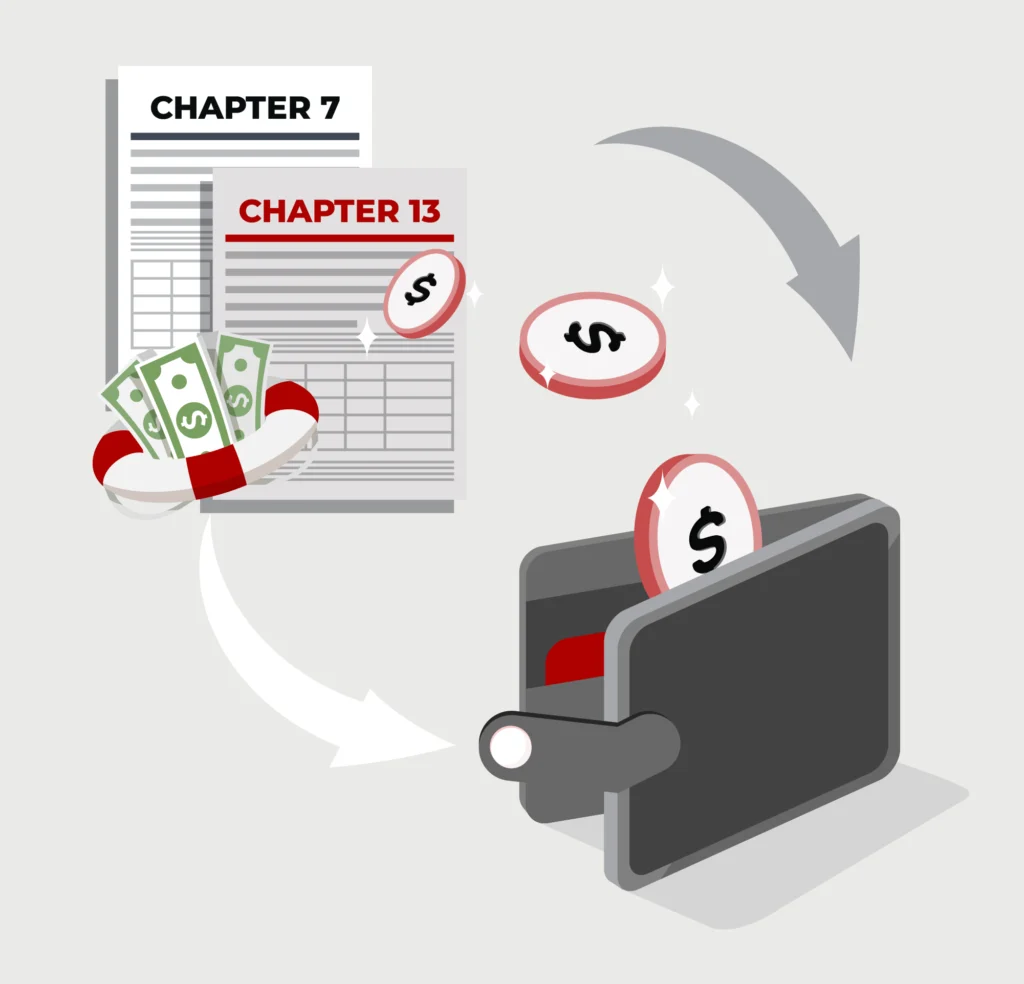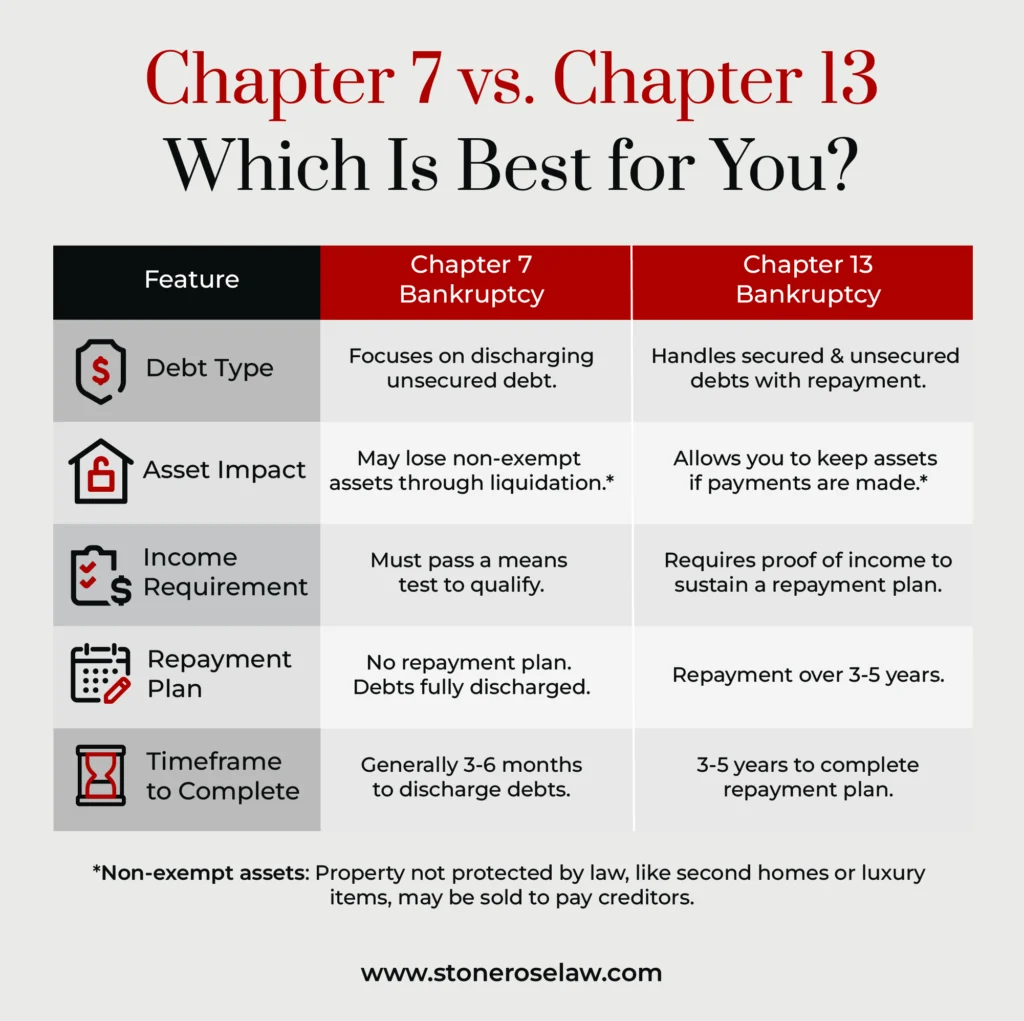No simple answer exists to this question because no minimum amount of debt is required to qualify for bankruptcy.
In this article, we introduce some of the factors to consider when deciding whether a petition in Chapter 7 or Chapter 13 bankruptcy is right for you. If you would like to speak with an Arizona bankruptcy attorney after reading here, call Stone Rose Law at (480) 739-2448 or use our contact form to set up a free consultation.
Because the amount of debt you owe is not determinative on its own when it comes to knowing whether bankruptcy is right for you, the following are some considerations other than your financial obligations to keep in mind when making your decision.

If you have petitioned for bankruptcy and had debts discharged recently, you may not be eligible to petition again until a minimum time interval has passed.
Here are the minimum times required before you can file for bankruptcy after a prior bankruptcy filing.
You cannot file for a second Chapter 7 bankruptcy until at least eight years have passed since your earlier Chapter 7 bankruptcy filing date. See the U.S. Bankruptcy Code, Section 727(a)(8).
How long you must wait depends on how much debt you paid under the prior Chapter 13 payment plan. According to Bankruptcy Code Section 727(a)(9):
Under Bankruptcy Code 1328(f)(1), if all creditor claims were paid under the terms of the past Chapter 7 bankruptcy, no waiting period exists to file for a subsequent Chapter 13 bankruptcy. However, if less than all claims were paid, a four-year waiting period exists before you can file for a later Chapter 13 bankruptcy.
Under Bankruptcy Code Section 1328(f)(2), a minimum two-year period exists before you can file for Chapter 13 bankruptcy after a prior Chapter 13.
Although no minimum debt amount exists to file for bankruptcy, a maximum amount applies for Chapter 13 bankruptcy filings up to March 31, 2025:
These limits apply if you are an individual considering personal bankruptcy or a sole proprietor. Different rules exist for businesses.
If you owe too much debt to file for Chapter 13, an experienced bankruptcy law attorney may help you find ways to reduce your debts to less than these maximum limits.
Based on your circumstances, if you can continue to pay back your debts over two years in a timely manner, bankruptcy may not be your first option. If you cannot afford to pay off the debts on time in the next two years, then you should consult with a bankruptcy attorney.
Why two years? Once you file bankruptcy, your credit score immediately begins to recover, and most people will hit full recovery into the 700s credit score by or before two years after filing. If you already have a low credit score, bankruptcy will trigger an immediate recovery, which is much quicker than trying to pay your debts.

Bankruptcy is not always the best option, even when you are carrying enough debt to make it a possibility. A bankruptcy filing also comes with its own costs, including a filing fee and legal fees.
Before filing for bankruptcy, it may be possible to find a way to work with your creditors short of bankruptcy to arrange for lower monthly payments. Some organizations can help you negotiate these lower payments. You can also settle with your creditors. However, having the money set aside to settle is recommended, which is at least 50% of your total debts.
Our attorneys will give you honest advice on whether there are better options than bankruptcy, such as debt consolidation services, a debt management plan with a credit counseling agency, and other forms of debt settlement, such as a payroll deduction plan.
If you believe a way exists to pay off your creditors and you want to keep your property that is subject to secured debt obligations, then a Chapter 13 bankruptcy may be your best choice.
This kind of bankruptcy creates a repayment plan under which you agree to repay your creditors part of what you owe them during the payment plan period, which is usually three to five years.
In return, you get to keep possession of property you might otherwise lose to repossession or liquidation in a Chapter 7 bankruptcy.
For Chapter 13 bankruptcy to work, you need to show the bankruptcy court that you have a source of income sufficient to make a payment plan work. A Chapter 7 bankruptcy proceeding may be better if you are unemployed or make little gross income.
If you owe so much debt that it is more than you believe you can realistically repay, you have a lot of unsecured dischargeable debts, and you want to get out from underneath all your debts by discharging them completely, then Chapter 7 bankruptcy could be a better option. Under Chapter 7, you may be required to surrender non-exempt assets for a trustee liquidation sale to pay your creditors.
To qualify for Chapter 7 bankruptcy, you must pass a means test. This generally means that your current monthly income must be below the Arizona median income for your household size.
If your income is at or above the Arizona median income, then the bankruptcy judge will consider additional factors, including your monthly income, expenses, and debt payments, to see if your disposable income still allows you to file for Chapter 7.
If you cannot qualify for Chapter 7 under the means test, a Chapter 13 bankruptcy petition is your better option.
Although secured and unsecured debts are dischargeable under Chapter 7 or Chapter 13 bankruptcy, not all debts can easily be discharged. These include;
We hope this information gives you a better sense of what you should think about when weighing whether bankruptcy protection is right for you. It is not a comprehensive analysis of everything you should consider and you should not take it as legal advice.
If you are seriously contemplating a bankruptcy petition in Arizona, want to stop phone calls from debt collectors, keep your car from being repossessed, and keep your home out of foreclosure, then we recommend you talk with a Stone Rose Law bankruptcy lawyer.
We can help you consider all the important factors in more detail, explain the benefits and consequences of declaring bankruptcy, and help you choose which bankruptcy option is potentially best for you.Call (480) 739-2448 or contact us online to learn more about your options.